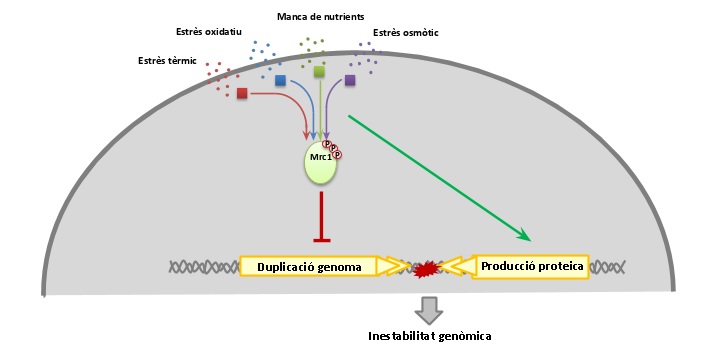The control mechanism that prevents damage to the genome when the cellular processes of replication and transcription coincide in time has been identified
The control mechanism that prevents damage to the genome when the cellular processes of replication and transcription coincide in time has been identified
The control mechanism that prevents damage to the genome when the cellular processes of replication and transcription coincide in time has been identified
The results obtained allow opening a new path in the diagnosis and prognosis of diseases associated with genome instability. The research, published today in Nature Communications, has been led by Francesc Posas and Eulàlia de Nadal, researchers of the Cell Signaling Research Group at UPF.
Genome instability, such as the loss of a chromosome or poor duplication of DNA, is the main source of mutations in the genome and the main cause of tumour transformation. One of the causes of genome instability is the lack of coordination between such cellular processes as protein production and the duplication of the genome that takes place during the cell division cycle.

Research conducted by researchers with the Department of Experimental and Health Sciences (CEXS) at UPF has identified a control mechanism by which cells coordinate these two processes, known as DNA replication and transcription, in order to avoid possible damage in the genome that gives rise to future diseases.
The study Multiple signaling kinase target Mrc1 to prevent genome instability triggered by transcription-replication conflicts has been published today in the journal Nature Communications, and allows opening a new unexplored path in the diagnosis and prognosis of diseases associated with genome instability.
The research has been carried out by the Cell Signaling Research Group, directed by researchers Francesc Posas and Eulàlia de Nadal. It also involved the collaboration of researchers from the Andalusian Molecular Biology and Regenerative Medicine Centre (CABIMER).
The importance of Mrc1 protein
It is through this protein that the control mechanism is activated that allows coordinating the strategies to prevent conflict between the processes of cell replication and transcription.
Replication is the molecular mechanism by which DNA produces a copy of itself. Every time a cell divides, the whole genome must be duplicated in order to be transmitted to the offspring. However, transcription is the process of protein synthesis, in charge of making cells function routinely.
In certain situations, such as in the face of sudden changes in environmental conditions, for example, the cell increases the demand for proteins in order to protect itself from external aggressions. In these special conditions, perfect coordination between high protein production and duplication of the genome is essential in order to prevent conflicts between the two processes and the consequent genome instability.
It is essential to protect the genome duplication process because in this time interval, the DNA is especially susceptible to alterations that may compromise cell functions and, therefore, that may be inherited by the daughter cell.
An increase in the demand for protein production when there are changes in environmental conditions at the same time as the genome is being duplicated is a very compromised situation for the cells. In these circumstances, the DNA copying machinery and the machinery that allows the production of proteins are found traveling in the same genome, which exposes them to a likely collision between them. If this happens, the DNA may suffer serious injuries and become altered.
This study has identified a control mechanism, regulated by the Mrc1 protein, which coordinates and stops the genome duplication process to avoid collision and subsequent genome instability. It guarantees the integrity of the cell genome and its viability in the face of environmental aggressions.
The relevance of the discovery opens the way to understanding how the cells of our body that do not coordinate the production of proteins and the duplication of the genome properly undergo changes in their genome and initiate a process of uncontrolled proliferation.
Reference work:
Alba Duch, Berta Canal, Sonia I. Barroso, María García-Rubio, Gerhard Seisenbacher, Andrés Aguilera, Eulàlia de Nadal and Francesc Posas. Multiple signaling kinases target Mrc1 to prevent genome instability triggered by transcription-replication conflicts. Nature Communications. doi: 10.1038/s41467-017-02756-x. January 2018
